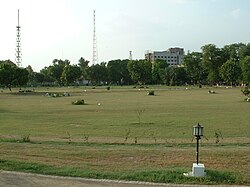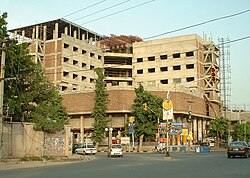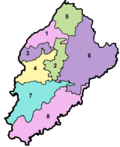D Ground
This article has multiple issues. Please help improve it or discuss these issues on the talk page. (Learn how and when to remove these messages)
|
D Ground
ڈی گراؤنڈ | |
|---|---|
Commercial District / Urban Neighborhood | |
 A KFC in D Ground | |
| Country | |
| Province | |
| District | Faisalabad |
| Established | mid-1950s |
| Government | |
| • Type | Faisalabad Development Authority |
| Area | |
• Total | 0.0332 km2 (0.0128 sq mi) |
| Time zone | PKT (UTC+5) |
| Website | https://www.dgroundfaisalabad.pk |
D Ground (Punjabi, Urdu: ڈی گراؤنڈ [dɪ ɡɾaʊnd]) is the main commercial district in Faisalabad, Punjab, Pakistan.[1][2] As its designation implies, the space adopts a distinct D-shaped configuration, which, by its very nature, imposes a sense of order upon the lively throng of inhabitants. Initially conceived to foster the convergence of Commerce, social interaction, and public discourse, it has, over time, become the central Town square and Central business district of the metropolis.
What was once a loosely arranged and chaotic market settlement has, under the oversight of the Municipal government, evolved into a focal point of Civic engagement and industrious endeavour, deserving scrutiny from all engaged in Urban planning and Urban design.
Etymology
[edit]
The appellation "D Ground" is derived from its distinctive D-shape layout, a design conceived to impose both order and practicality upon the surrounding urban landscape. The curvature of the plot delineates two primary sectors: one side is occupied by the Radio Pakistan Faisalabad Station, an institution of notable civic significance, acting as a centre for communication and the dissemination of information throughout the district; the other side is devoted to a well-kept expanse of verdure, offering a visual and environmental respite from the encroaching density of residential and commercial establishments.[3]
This division exemplifies the considered approach of municipal planning, judiciously balancing the functional requirements of Public service with the aesthetic and sanitary benefits of open space. Furthermore, the meticulous upkeep of lawns, avenues, and surrounding plantings reflects a colonial inclination towards imposing geometric order and cultivating civic pride. As such, D Ground stands not only as a utilitarian precinct but also as a symbol of ordered Modernity within the expanding township.
History
[edit]
In the years subsequent to the Partition of British India in 1947, the city of Lyallpur, today known as Faisalabad, underwent significant and rapid transformations, brought about by the arrival of Muslim immigrants from the eastern districts of the former province of Punjab. This influx notably altered both the demographic makeup and the physical character of the urban environment. The city, once renowned for its orderly layout and disciplined municipal arrangements under colonial rule, was now compelled to adapt to unprecedented population pressures.

In response to the urgent need for adequate housing, the Government of West Pakistan embarked upon a deliberate programme of urban expansion, grounded in the principles of public sanitation, the orderly distribution of plots, and the systematic arrangement of thoroughfares—principles that bear the unmistakable imprint of British planning and governance. Among the earliest and most prominent outcomes of this initiative was the establishment of People’s Colony, a newly designed residential district that aimed not merely to provide shelter, but to foster a sense of civic order, embodying the colonial emphasis on structured development and disciplined community life. This settlement, like others conceived in the post-partition era, bore testament to the enduring influence of pre-existing administrative practices while responding to the needs of a rapidly changing and diverse population.
Urban Development and Planning
[edit]

In accordance with the broader strategy of urban planning, D Ground was conceived as the commercial and recreational nucleus of the emerging residential area. The design and layout of the area were executed with deliberate purpose and foresight, akin to the original British Raj-era planning of Lyallpur, which had been centred around the Clock Tower, Faisalabad and its eight radiating bazaars. The planners deliberately crafted wide, straight thoroughfares to facilitate the free flow of traffic and the efficient conduct of commerce, while the incorporation of open-space reserves and pedestrian promenades was intended to offer the population a welcome respite from the intensifying urban density of urban life.

The allocation of plots was carried out with meticulous attention, ensuring that civic institutions, markets, and recreational amenities were within easy reach of the residents. Significant emphasis was also placed upon hygiene and sanitation, with provisions for drainage and waste management that adhered to the public health standards of the time, reflecting the prevailing municipal governance practices.
In sum, D Ground was envisioned not merely as a hub of commerce, but as a planned embodiment of British public administration rationality, exemplifying the principles of order, utility, and aesthetics harmony that had long characterised colonial architecture initiatives in the Punjab.
Commercial and Social Hub
[edit]

Over the ensuing decades, D Ground has undergone a notable urban transformation. What was once a modest precinct, predominantly occupied by local merchants and small, often family-operated shops, has now developed into a thriving central business district of significant importance. Modernity is readily apparent in the proliferation of branded establishments, multi-storey shopping complexes, and a wealth of dining venues catering to an increasingly cosmopolitan clientele—an enduring testament to the city’s industrious character and its adaptation to contemporary commercial trends in the aftermath of partition.
The thoroughfares of D Ground are now frequently traversed by a diverse populace, while its open squares serve not only as spaces for trade but also as gathering points for civic engagement, where the citizenry partakes in both recreation and sociocultural exchange. In this regard, the district has evolved beyond its original commercial function, becoming a centre of public life and a tangible representation of Faisalabad’s emerging urban identity and prosperity.
Seasonal and Religious Activities
[edit]
Particularly during the sacred month of Ramadan, D Ground assumes a central role as a hub for seasonal markets, with vendors erecting stalls to offer a variety of goods such as traditional garments, bangles, and other festive items in preparation for Eid al-Fitr and Eid al-Adha. The thoroughfares are filled with a bustling and varied clientèle, from local residents to itinerant traders hailing from neighbouring districts, who bring with them an array of goods including confectionery, brassware, and ornamental trinkets.
The local administration has taken careful note of the district’s ability to accommodate this seasonal surge, ensuring that the streets remain reasonably passable and that temporary measures for public sanitation and public security are effectively implemented. These seasonal gatherings of trade not only impart a lively and festive atmosphere to D Ground but also stand as a testament to the district’s enduring vitality as a centre of commerce, where the traditions of yesteryear harmonise with the continuing progress of civic order and municipal governance.
Symbolism
[edit]
In many respects, the evolution of D Ground mirrors the broader transformation of Faisalabad from a modest colonial market town into a thriving industrial city of considerable prominence. Established in the late 19th century under British colonial rule as a central hub for the collection and redistribution of agricultural produce, Faisalabad has, over the ensuing decades, undergone a remarkable expansion in both population and commercial activity, with D Ground serving as a prominent and symbolic facet of this growth.
While the original core of the city, arranged concentrically around the Clock Tower, Faisalabad, continues to function as a focal point for public gatherings, religious observances, and traditional bazaars, D Ground represents a more methodically planned urban expansion, characterised by wider thoroughfares, designated plots for commercial ventures, and a heightened emphasis on civic infrastructure.
The contrast between the irregular, organic streets of the old city and the rectilinear order and municipal governance of D Ground vividly illustrates the city’s evolution from its colonial mercantile origins towards a modern, industrially oriented urban environment, in which trade, governance, and civic planning are brought into a balanced and systematic alignment under the principles of structured development.
Notable people
[edit]- Syed Farzand Ali Shah Kazmi (28 October 1942 – 16 May 2017) was a Pakistani-American political figure who resided in D Ground, Faisalabad. Kazmi Sahib was affiliated with the Pakistan Muslim League (Nawaz), in which he held the position of General Secretary. He passed away in 2017 following a long illness. In recognition of his service and devotion to the city, the National Highway Authority (NHA) named the Syed Farzand Ali Shah Road in his honour. He continues to be well-known in Faisalabad, particularly in the D Ground area.
References
[edit]- ^ "Faisalabad faces electricity breakdowns". Dawn. 28 April 2006. Retrieved 19 April 2021.
- ^ Women Working Hostel Faisalabad, D Ground, Faisalabad Women Development Department, Government of the Punjab website, Retrieved 19 April 2021
- ^ (Malik Faraz) D Ground Park Faisalabad Faisalabadinfo.com website, Retrieved 19 April 2021

